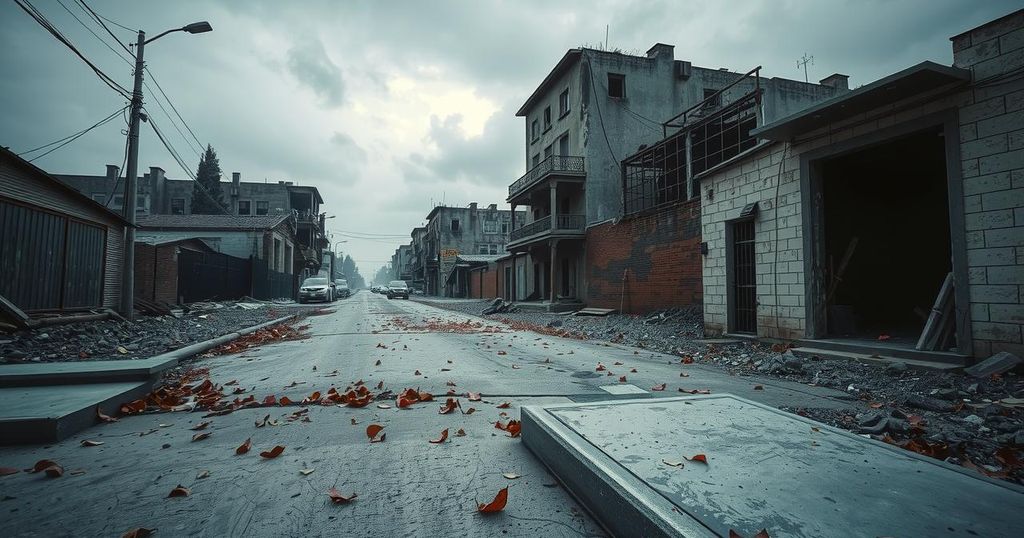The Democratic Republic of Congo is experiencing a deadly insurgency led by the M23 rebel group, with significant implications for regional stability and global mineral supply chains. The conflict has caused extensive displacement, fatalities among UN peacekeepers, and dire humanitarian conditions in Goma. International responses have been inadequate, raising questions about the West’s role while China’s interests remain deeply entrenched in the region’s mineral resources.
A significant insurgency is currently engulfing the Democratic Republic of Congo (DRC), a vast nation rich in minerals crucial for modern technology. The rebel group M23 is aggressively expanding its territory from Goma, marking the most severe escalation in a protracted conflict that has persisted for 13 years. The United Nations warns that the escalating violence risks devolving into a broader war in a historically tumultuous region.
Corneille Nangaa, the leader of M23, has publicly declared his intent to advance towards Kinshasa, the capital of the DRC, following the capture of Goma. In response, the Congolese government has initiated a major mobilization effort, with President Félix Tshisekedi asserting the necessity to reclaim lost territory. The DRC, located approximately 4,000 miles from the U.S., plays an influential role in global mineral supplies, making the repercussions of this conflict potentially pervasive.
The DRC has a long history of conflict dating back to its independence from Belgium in 1960, with the latest violence escalating for about three years, particularly since January when clashes between national forces and M23 insurgents intensified. Amid the ongoing turmoil, over 400,000 individuals have been displaced, and multiple UN peacekeepers have fallen victim to the violence. The deteriorating conditions in Goma have been described as dire, with reports of bodies in the streets and a lack of essential resources.
The international community’s response has been muted despite the brutal nature of the ongoing conflict. Romanian mercenaries, initially engaged to assist the Congolese government, have found refuge at a UN base after surrendering. French Foreign Minister Jean-Noël Barrot recently discussed the situation with President Tshisekedi, amidst widespread protests against perceived global inaction. Experts emphasize that the credibility of Western nations is at stake due to their lack of decisive action.
M23 comprises primarily ethnic Tutsi individuals, rooted in a historical conflict stemming from tensions between Rwanda and the DRC. Following an ethnic genocide in Rwanda in 1994, many Tutsi sought refuge in eastern DRC. Various peace agreements have produced mixed results concerning the integration of Tutsi rebels into the Congolese army, which has fueled ongoing conflict. The UN has previously stated that M23 receives military support from Rwanda, a claim contested by Kigali.
The DRC’s mineral wealth, particularly cobalt—critical for electric vehicle batteries and smartphones—adds a layer of complexity to the conflict. Approximately 80% of the DRC’s cobalt production is under Chinese ownership. China’s condemnation of the M23 insurgency highlights concerns that escalating violence threatens vital mineral supply chains, though experts indicate an immediate threat to mineral extraction is still low.
Rwanda’s involvement in the conflict is significant, with historical implications from its previous incursion into Goma in 2012. Since then, Rwanda has significantly embedded itself in international business relations, presenting itself as a reliable partner, which complicates Western responses to its alleged support of M23. The German Development Ministry has excluded Rwanda from upcoming meetings, yet aid flows to Rwanda remain intact despite the ongoing crisis.
The Democratic Republic of Congo (DRC) has long been embroiled in conflict, exacerbated by ethnic tensions, external influences, and its wealth of natural resources. The M23 rebel group, largely composed of Tutsi, emerged from historical grievances related to Rwandan ethnic conflicts and seeks to control territories in the DRC. The ongoing violence threatens regional stability and poses implications for global supply chains reliant on the DRC’s mineral wealth, notably cobalt, crucial for modern technology and renewable energy sources. The persistence of armed groups in eastern Congo, particularly M23, has led to significant human displacements and casualties, drawing international concern. Various international actors have reacted to the situation, but their responses have often been viewed as insufficient considering the rapid escalation of violence and humanitarian crises. The consequences of the conflict are likely to influence geopolitical dynamics, particularly concerning Western foreign policy and the interests of nations like China and Rwanda that engage deeply in the region.
The current conflict in the DRC, driven by the M23 insurgency, not only results in severe humanitarian crises but also threatens global mineral supply chains critical for technology and electric vehicles. The history of violence, ethnic tension, and external influences complicates international responses, as evidenced by the muted reactions from Western nations. As the situation unfolds, the stakes grow higher, raising concerns about regional stability and global repercussions.
Original Source: www.nbcnews.com






